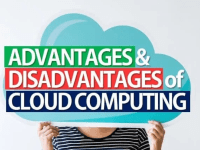Advantages and Disadvantages of Cloud Computing – Cloud computing has revolutionized the way businesses and individuals store, manage, and access their data. It is the delivery of on-demand computing resources over the internet, including servers, storage, databases, software, analytics, and intelligence.
Cloud computing offers numerous advantages, such as cost savings, scalability, flexibility, and global access. However, it also has some disadvantages, including security risks, dependence on internet connectivity, and lack of control. In this article, we will explore the advantages and disadvantages of cloud computing and help you make an informed decision about whether it is right for you.

Advantages of Cloud Computing
- Cost Savings: Cloud computing can significantly reduce the costs of hardware, software, and IT support. You only pay for what you use, and you do not need to invest in expensive servers, storage devices, or software licenses. The cloud provider handles the maintenance, upgrades, and backups, saving you time and money.
- Scalability: Cloud computing allows you to easily scale up or down your resources as your business grows or shrinks. You can quickly add or remove servers, storage, or users without worrying about hardware limitations or capacity planning.
- Flexibility: Cloud computing provides you with the flexibility to work from anywhere, anytime, and on any device. You can access your data and applications from a laptop, tablet, or smartphone, as long as you have internet connectivity.
- Global Access: Cloud computing enables you to access your data and applications from anywhere in the world, as long as you have internet connectivity. This is especially useful for businesses with multiple locations, remote workers, or customers in different countries.
- Automatic Updates: Cloud computing providers regularly update their software and services, ensuring that you always have the latest features and security patches. You do not need to worry about software upgrades, compatibility issues, or downtime.
Also Read About Artificial Intelligence (AI)
Disadvantages of Cloud Computing
- Security Risks: Cloud computing involves storing your data and applications on someone else’s servers, which can be a security risk. You need to trust the cloud provider to secure your data and prevent unauthorized access, hacking, or data breaches.
- Dependence on Internet Connectivity: Cloud computing requires a reliable and fast internet connection. If your internet goes down, you may not be able to access your data or applications. This can be a major problem for businesses that rely on the cloud for their operations.
- Lack of Control: Cloud computing providers may limit your ability to customize or configure their services according to your needs. You may also have limited control over your data, backups, or security policies.
- Privacy Concerns: Cloud computing providers may collect and analyze your data for their own purposes, such as improving their services or targeting ads. You need to be aware of their privacy policies and ensure that your data is protected and not shared with third parties without your consent.
- Legal and Compliance Issues: Cloud computing involves storing and processing data across multiple jurisdictions, which can raise legal and compliance issues. You need to ensure that your data is stored and processed in compliance with local laws and regulations.
Conclusion
This revolutionary technology holds immense potential for cost savings, scalability, flexibility, and global access. It can empower us to do more, be more, and achieve more than ever before. But, like a double-edged sword, cloud computing also exposes us to security risks, dependence on internet connectivity, and a lack of control that can leave us feeling vulnerable and powerless.
As you ponder whether to adopt cloud computing for your business or personal needs, it’s crucial to acknowledge the emotional impact of this decision. You may feel drawn to the benefits that cloud computing promises, such as the ability to streamline operations, reduce costs, and collaborate more effectively. You may also feel excited by the potential to tap into the latest software and technology without the need for expensive hardware or infrastructure.
However, you may also feel anxious about the security of your data and applications, as well as the potential for cyber attacks and data breaches. You may feel frustrated by the dependency on internet connectivity, which can lead to downtime and performance issues. And you may feel a loss of control as you entrust your technology to third-party providers, who may not share your values or priorities.
As a seasoned writer, I know that the best way to navigate these emotional waters is to weigh the pros and cons of cloud computing with a clear mind and an open heart. You must consider the benefits and risks of this technology in light of your unique needs and goals, and determine whether it aligns with your values and aspirations. You must also engage in ongoing dialogue with your service providers to ensure that they understand your needs and priorities, and that they are committed to delivering high-quality service that meets your expectations.
FAQs
- What is cloud computing? : Cloud computing is the delivery of on-demand computing resources over the internet, including servers, storage, databases, software, analytics, and intelligence.
- How does cloud computing save costs? : Cloud computing saves costs by reducing the need for expensive hardware.
- Is cloud computing secure? : Cloud computing involves storing your data and applications on someone else’s servers, which can be a security risk. However, cloud providers use advanced security measures to protect your data, and you can also take steps to enhance your security.
- Can I customize my cloud services? : Cloud computing providers may limit your ability to customize or configure their services according to your needs. However, some providers offer more customization options than others.
- How do I ensure compliance with local laws and regulations? : You need to ensure that your data is stored and processed in compliance with local laws and regulations. This may require consulting with legal experts or using a cloud provider that offers compliance certifications.




